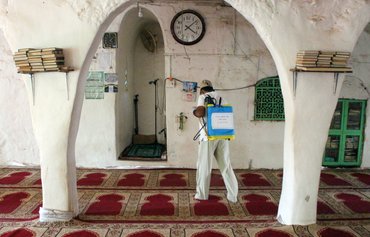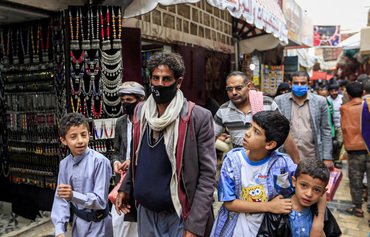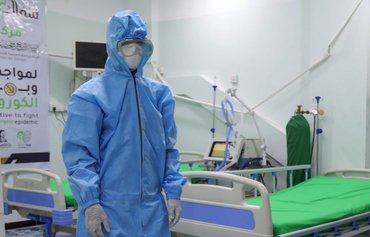Yemen's supreme emergency committee for combatting novel coronavirus (COVID-19) has reported nine new cases in Aden and Hadramaut provinces, raising the total number of infections in government-controlled areas to 21.
Meanwhile, the Iran-backed Houthis (Ansarallah) announced the first coronavirus death in Sanaa's administrative district, which is under their control.
The Yemeni committee reported eight new infections in Aden, including one death, and one new case in Hadramaut province.
A Somali migrant was the first victim of coronavirus in Sanaa, according to Houthi health official Taha al-Moutawakel.
The Houthi-controlled health ministry "received notification about the presence of the case at a hotel in Sanaa's administrative district on Sunday", al-Moutawakel said during a press conference in Sanaa.
"Directly after that, the epidemiological monitoring teams moved to the hotel and found that the man had died," he said.
A lab test confirmed COVID-19 infection, he said, adding that the hotel was disinfected and those who had contact with the man were placed under isolation.
Call for transparency
Yemen Health Minister Nasser Baum urged health workers in Houthi-controlled areas to be transparent in their disclosure of infections, as the Yemeni government has been in its disclosure of cases in Hadramaut, Aden and Taez.
"Covering up cases will harm all Yemenis, given that the pandemic does not differentiate," he said.
"Any hiding of information will not be in the interests of the Yemeni people and will further spread the virus," he added.
He called on Aden's local authority to impose a full curfew for at least two weeks so epidemiological monitoring teams can do their job and trace infections or suspected cases of COVID-19, in addition to other precautionary measures.
The government has allocated 580 million Yemeni riyals ($2.3 million) to provincial and local authorities, Baum noted. This is in addition to 500 million riyals which will be distributed soon to the health isolation centres.
Deputy Minister of Health Ali al-Walidi told Al-Mashareq that coronavirus patients in Aden, Hadramaut and Taez are receiving treatment and are in stable condition.
In these areas "epidemiological monitoring teams have already traced contacts and taken the necessary measures", he said.
"People need to abide by the instructions of the supreme emergency committee for COVID-19, including social distancing and going out of home only when necessary," he stressed.
Curfew in Sanaa
The emergency committee in the Houthi-controlled Sanaa administrative district ordered the closure of 10 residential neighbourhoods for 24 hours as of midnight Wednesday, as a precaution.
According to political analyst Faisal Ahmed, medical sources in Houthi-controlled areas have confirmed there are coronavirus cases and that they had been instructed not to disclose this information, or they would face consequences.
"Last week, the Houthis closed a number of markets in Sanaa under the pretext of disinfecting them, after suspected cases were discovered," he told Al-Mashareq.
"They also imposed compulsory quarantine on the families of suspected cases, but they have not yet announced the final results about their conditions," he said. "This is very suspicious."
Using vehicles and loudspeakers, the Houthis urged residents of the 10 neighbourhoods where the curfew was announced to stay at home.
Virus-related closures
After the cases were announced in Aden, neighbouring Lahj province announced a closure of crossings and prevented residents from travelling.
The Lahj governor urged residents to stay at home, and said the province would carry out awareness and disinfection campaigns in an attempt to stop the virus from spreading to the extent of its abilities, given its limited resources.
In Marib province, the local authority also approved precautionary measures to combat coronavirus, including stepping up testing at entrances and supporting the health response teams with testing centres that operate around the clock.
Other measures include disinfecting public areas, preventing gatherings at qat markets, weddings and other events, and stepping up monitoring of malls and markets to ensure they abide by the precautionary measures.

![A man, wearing a protective mask amid the COVID-19 pandemic, walks past shops in the heart of Sanaa on May 5th. [Mohammed Huwais/AFP]](/cnmi_am/images/2020/05/06/23931-Sanaa-coronavirus-mask-600_384.jpg)







O uncle, these are just words and nonsense!
Reply1 Comment(s)